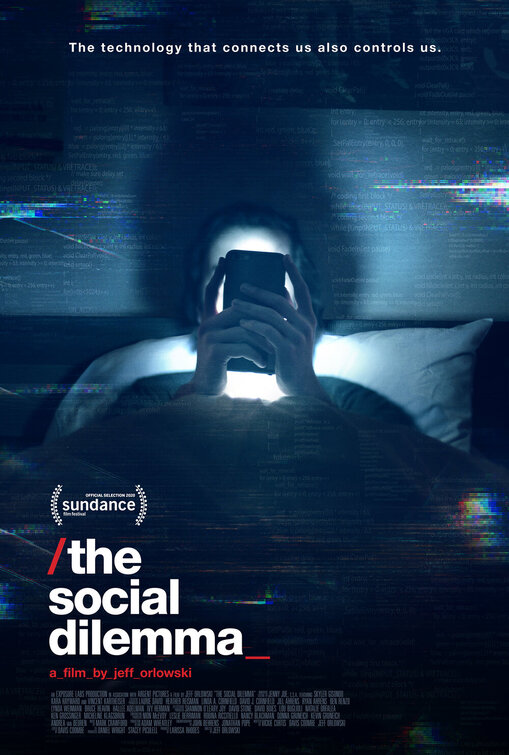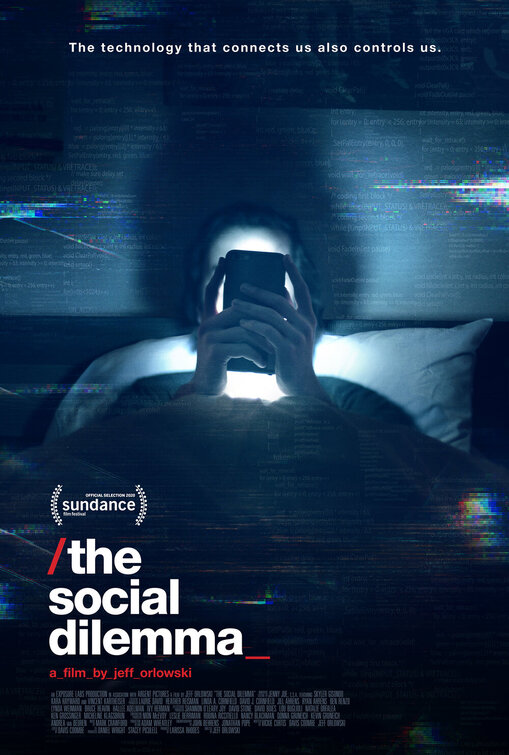
![]()
Any relevant documentary that sounds the alarm on a societal ill should satisfy at least two prerequisites: (1) Does the negative conduct actually exist? And (2) if it does, is that behavior shocking? I’d say The Social Dilemma supports a clear YES to the first question and a hard NO to the second.
This chronicle is presented as an expose as well as a cautionary tale. The creators of Facebook, Twitter, Instagram, and other interactive media have purposefully designed their products to be “addictive” so that you keep using them. Successful social media platforms are essentially “guilty” of creating a product people crave. No surprise there. The supposed insight is that they do this by getting to know the things you like and then promoting those things so you keep using their service. Of course, these channels are free so perhaps an even bigger epiphany is that we, the “users”, are the products being sold. Advertisers are the consumer buying the information we provide. The more we interact with social networks the more advertisers can sell us products. Are you surprised? Then I have another revelation: the more TV you watch, the more likely you will be exposed to commercials.
The Social Dilemma did its research. Many of the bigwigs being interviewed here are former high ranking leaders at technology companies and picking their brains about these subjects is indeed fascinating. Tristan Harris, former Google Design Ethicist (!), makes a memorable appearance. His and others’ disapproval at the persuasive techniques employed may sway you. However, I don’t think it’s outrageous that content on these services is manipulated toward the user. I expect to see different ads and information than others. This happens everywhere. The commercials during cartoons advertise toys and those during sports programming promote beer. If that concept is unfamiliar, then this docudrama might be alarming, but I keep coming back to TV because the comparison is so apt. Intellectuals regarded television as the Big Bad for years until the internet came along.
This account discusses a lot of topics over the course of 89 minutes. I reacted to most of it with a shrug and a lot of “I already knew that.” However, it briefly touches on the effect of social networks on teens. If this document should scare anyone, it’s parents whose impressionable children might be more deeply affected by these tactics. Mental health is the most interesting aspect and a worthy subject of a separate study. Dramatic reenactments sprinkled throughout are supposed to show in a concrete way how agents behind the scenes target us. Actor Vincent Kartheiser portrays the human embodiment of the artificial intelligence inside your phone. Skyler Gisondo and Sophia Hammons play teen victims. Most of these conspiracy theory dramatizations are unintentionally funny but they do sort of undercut the solemnity of the atmosphere so I kind of appreciated them. Conspiracy theories are powerful stuff and this movie has supposedly caused a large number to delete their Facebook. I have no proof as to whether that is in fact true. If it is, then perhaps this documentary is contributing more to the common good than I realize.
09-11-20


4 Responses
I enjoyed the documentary, the dramatization are cringe inducing unfortunately.
Ha ha. They were definitely amusing.
I agree, this is stuff I already knew, or figured. I was enlightened about the problems it causes for young kids. Statistics are outrageous. 3 stars
There are 3.5 billion smartphone users. This affects a lot of people.